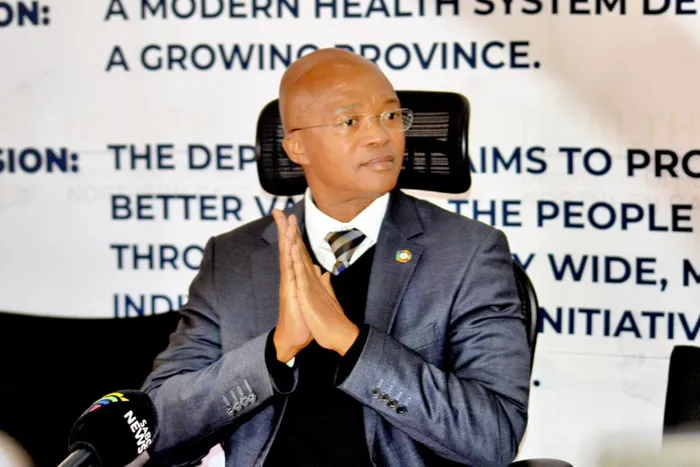'Shape up’? No, MEC — it’s time to ship out
OPINION

the Northern Cape MEC for Health, Maruping Lekwene.
Image: Supplied / Northern Cape Department of Health
AFTER reading the damning Health Ombud’s report on the treatment and deaths of psychiatric patients in Kimberley, only one conclusion is clear: the Northern Cape MEC for Health, Maruping Lekwene, should not be promising to “shape things up” — he should be stepping down in disgrace and taking his top officials with him.
The horrors exposed at the Northern Cape Mental Health Hospital (NCMHH) and Robert Mangaliso Sobukwe Hospital (RMSH) are not bureaucratic mishaps or unfortunate oversights — they are systemic failures that led directly to the deaths and suffering of vulnerable patients. Two people died under conditions so appalling they beggar belief. A third is now permanently bedridden. These are not statistics. They are victims of negligence, of mismanagement, of a department in chaos.
One patient died from pneumonia — a treatable condition — because it went entirely unacknowledged for three days as he lay deteriorating in a recovery unit. Another died from exposure to the elements in a government-run hospital. Let that sink in. In the height of a Kimberley winter, a mental health patient froze to death. The heating systems didn’t work because the hospital had no electricity for an entire year. And why? Because of “dysfunctional supply chain management,” according to the Ombud.
This isn’t just incompetence. It is cruelty through neglect. And the person ultimately responsible for this — as the Health Ombud made clear — is the leadership at the very top of the Northern Cape Department of Health. That means you, MEC Lekwene.
In his media briefing, the MEC expressed regret. He said all the right things — task teams, disciplinary processes, professional body referrals. He promised action, reform, and accountability. But these are the same promises the public has heard year after year, while the rot has spread and deepened under his watch.
Lekwene has been at the helm since 2020. During this time, leadership instability has become a defining feature of the Department. The Ombud cites this instability as a key factor that “negatively affected service delivery, safety, and the quality of patient care.” NCMHH was found to have poor governance, a systemic lack of leadership, and a total unpreparedness for emergencies. It had crumbling infrastructure, inadequate medicine control, dismal record-keeping, and almost no functioning oversight mechanisms. None of this happens overnight. It is the product of years of failure — a leadership vacuum where lives have been lost as a result.
The MEC would now like us to believe that, having presided over this carnage, he is the right person to clean it up. But one cannot be both arsonist and firefighter. If Lekwene and his senior officials had the capacity, the courage, or the will to fix the Northern Cape health system, they would have done so long before patients began dying from cold and neglect.
Instead, the Department dragged its feet while critical infrastructure failed, while patients went without proper food, heat, or treatment, and while hospitals became more dangerous than the streets. Electricity at the mental health hospital was only restored a year after it failed. Resuscitation equipment didn’t work because there was no power. And the department, when warned by its own clinical manager about the deadly conditions, did nothing.
Former Public Works MEC and ANC provincial chairperson John Block — along with several senior officials and consulting engineers — has been charged in a corruption case linked to the hospital’s construction. The charges include fraud, corruption, and money laundering related to a R51 million tender dating back to 2005. This case is a stark reminder that the decay in the system is not new — it is entrenched, and it has thrived in an environment with little accountability.
That same culture of impunity, mismanagement, and political protection has allowed the health system to collapse from the inside — slowly, then all at once.
In fact, the Department’s internal investigations into suspicious procurement practices and over-inflated prices — which the Ombud flagged as serious — are still “in progress”. The MEC now says a forensic team might be appointed. Might? After R2.1 billion spent and patients left to die in squalor, the urgency is still not there.
There’s a word for this: impunity.
Worse still, the Ombud confirmed that there was no effective monitoring of patients’ vitals, no emergency preparedness, and no functioning communication systems in place. NCMHH didn’t even have working phone lines. These are not failures of resources — they are failures of leadership, ethics, and basic humanity.
Let us be clear: reshuffling staff, forming task teams, and promising to “shape things up” are no longer good enough. The public is tired of being treated like fools. The public is tired of being told that things will improve when the same people who let the system collapse are still in charge.
Accountability must mean more than media briefings and empty reassurances. It must mean consequences. And in this case, real consequences begin with resignations.
The lives lost cannot be restored. But trust — if it is to be regained — must start with an honest reckoning. The MEC must take responsibility for the state of the Health Department. Not only because he is politically accountable, but because his leadership, or lack thereof, is inseparable from the horror that unfolded.
Northern Cape residents deserve a public health system that doesn’t kill the vulnerable. They deserve leadership that puts lives before patronage and performance before spin. And they deserve a department whose senior officials do not need to be pushed to act only once a national scandal erupts.
If MEC Lekwene has any sense of decency or duty left, he should resign. Not next week. Not after the task team is appointed. Now.
Only then can the Northern Cape Department of Health begin to rebuild — with new leadership, renewed urgency, and a commitment to never again abandon the people it exists to serve.
…
* The opinions expressed in this article are those of the author and do not necessarily reflect the views or policies of the DFA or its staff. While we strive to provide a platform for diverse perspectives, the content remains the sole responsibility of the contributor. Readers are encouraged to form their own opinions based on a range of information sources.
** Do you have something on your mind? We’d love to hear from you! Share your thoughts, opinions, or experiences by submitting a Letter to the Editor. Your voice matters and could inspire or inform others in our community. Submit your letter via e-mail to info.dfa@acm.co.za and you could see your words featured in the DFA.

We’d love to hear from you! Share your thoughts, opinions, or experiences by submitting a Letter to the Editor.
Image: Morgan Morgan / DFA